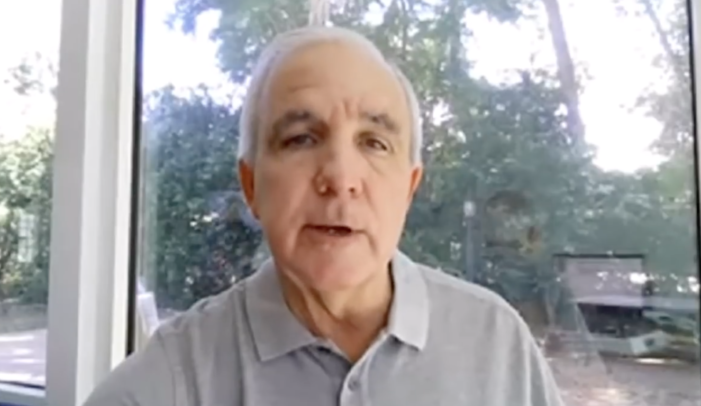As expected — or perhaps as threatened — Mayor Carlos Gimenez on Friday vetoed a county ordinance that revived a civilian review panel for questionable local law enforcement action in the wake of George Floyd’s murder by a Minnesota Police officer.
He also wants to deprive voters of the chance to make the  Independent Review Panel part of our charter in November.
Independent Review Panel part of our charter in November.
It’s not just expected because Gimenez hinted at a possible veto when the ordinance was discussed last week that he would veto the legislation — sponsored by Commissioner Barbara Jordan and passed 8-5 earlier this month — when he asked if he and county commissioners could also be subpoenaed by the panel for its inquiries and was told of freaking course they can.
It’s also expected because Gimenez likes to be above the law and wants to stay there. Here’s a guy who paid his congressional campaign qualification fee with a PAC account and had the elections department stay open late in 2016 so he could file a second qualification check because the first was invalid. It’s the same guy who eliminated the Miami-Dade Police public corruption unit after they found absentee ballot fraud connected to his campaign in 2012.
Read related: Miami-Dade moves forward with police reform post George Floyd protests
Even in his own words, Grimenez admits that he doesn’t want to be held accountable.
“I am in full support of having an Independent Review Panel to check on law enforcement procedures and ensure they are being followed,” he wrote, adding that he was also in favor of having the public vote on a charter change — but not yet. “Unfortunately, the amendment as written does not provide a clear exemption for County employees or elected officials from being subpoenaed.”
A clear exemption? Are you kidding me? Is there a reason why it should? What is Grimenez afraid of? Or is the Republican congressional candidate trying to sound more like Donald Trump, taking a page from the president’s playbook.
The mayor says he wants the commission to approved Jordan’s “much improved” (read: watered down) IRP legislation, which has no teeth to subpoena him or his cronies, including Commissioner Esteban 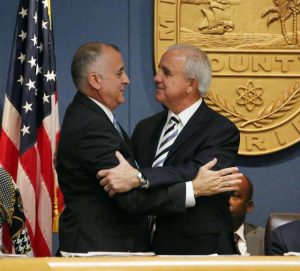 Bovo, who he hopes becomes the next mayor and also opposed the panel.
Bovo, who he hopes becomes the next mayor and also opposed the panel.
“Our law-enforcement officers work very hard every day to build trust with all sectors of our community,” the mayor wrote in his statement on the veto, which, of course, came late on a Friday afternoon, which is where “negative” government news goes to die.
“We have a number of nationally recognized community outreach programs in place, body cameras for police, layers of federal, state and local police oversight and a zero tolerance policy for abuses — all to ensure our officers are treating everyone with the respect they deserve.”
Um, Ladra doesn’t know if anybody noticed, but none of that has anything to do with the subpoena power. Which supports the theory among black leaders and other IRP supporters that this is a politically-motivated decision and that he’s using the subpoena power as cover to veto legislation he simply doesn’t want anyway. More smoke and mirrors.
And zero tolerance? There have been instances where the tolerance has been a solid 10!
Read related: State Attorney should investigate illegal arrests of four FIU protesters
Even Miami-Dade State Attorney Kathy Fernandez-Rundle — who is not known for being tough on cops — was in favor of the new panel, which we wouldn’t really need if she did her job.
“While the vast majority of officers are good, honest, and hard-working people who place their lives on the line for us each and every day, there are some who are not worthy of carrying the badge. Sometimes, there is conduct or misconduct that needs to be addressed before an excessive and unnecessary use of  force and potential tragedy occurs,” Fernandez-Rundle told the commission in a June statement when they first discussed Jordan’s legislation.
force and potential tragedy occurs,” Fernandez-Rundle told the commission in a June statement when they first discussed Jordan’s legislation.
“During my tenure, my office has prosecuted hundreds of police and correctional officers for criminal conduct. But, I can only do so much. I cannot do anything about non-criminal misconduct and people need a place to air their grievances,” she said.
For weeks after Floyd’s death at the hands of police, members of our community protested and cried out for increased police accountability in mostly peaceful protests. Gimenez was deaf to their cries for a venue where civilians can bring complaints to light.
“An active, inclusive, and fully-funded IRP will be an important step in answering those calls,” Fernandez-Rundle said, adding that her office, which helped the Citizens Independent Panel in Miami, would work with the county to ensure the board was balanced. “Restoring the public’s trust in our police departments must start with providing sufficient transparency to let those who feel victimized by a police action have an additional chance to tell their story and hold the police, our police, accountable.”
Read related: Charges dropped against FIU protesters and arrest reports don’t match 911 call
People have definitely been treated with disrespect. Like the four Florida International University students who were illegally arrested last month during a peaceful Black Lives Matter protest whose charges were dropped later after prosecutors realized police abused their power. What if there were 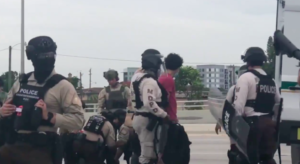 communications between those police officers or the commander/chief and some elected? Why is that elected to be protected from testifying to what truthfully happened unless there is some guilt?
communications between those police officers or the commander/chief and some elected? Why is that elected to be protected from testifying to what truthfully happened unless there is some guilt?
You don’t have to be anti-police to be pro BLM and pro IRP. Ladra doesn’t understand why that isn’t just understood across the board, why the Republican Party, mostly, make this about being against the police. Ladra has lots of friends in lots of different law enforcement agencies and police departments. The thing is, most of them welcome an IRP because they know that they are not above the law either.
It’s not enough to leave the police to police the police. That hasn’t worked. And unions wouldn’t be completely void of credibility if they didn’t defend every single cop that effed up royally. Pick your battles. As long as their role is to always defend the officer, they can’t be considered a viable venue for civilians.
Commissioner Jordan, smelling the veto on its way, tried to have the motion reconsidered July 9, in a 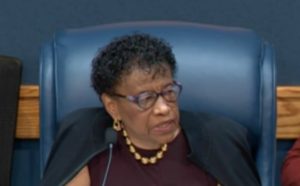 carry over meeting from July 8. But she failed to get a majority vote to reconsider an amended motion, even though the original intent has been stripped to near nothingness. Gimenez already vetoed the panel in 2018 — so it’s the second time he thinks he knows better than the commission about this — so Jordan compromised, making the 13 members of the panel appointed by the mayor and commission instead of community groups. It would be allowed to subpoena witnesses, documents and other potential evidence, then submit a report to the mayor, commissioners and police director (or soon to be elected sheriff).
carry over meeting from July 8. But she failed to get a majority vote to reconsider an amended motion, even though the original intent has been stripped to near nothingness. Gimenez already vetoed the panel in 2018 — so it’s the second time he thinks he knows better than the commission about this — so Jordan compromised, making the 13 members of the panel appointed by the mayor and commission instead of community groups. It would be allowed to subpoena witnesses, documents and other potential evidence, then submit a report to the mayor, commissioners and police director (or soon to be elected sheriff).
In addition, the state Supreme Court in 2017 ruled that subpoenaing officers violate a statute in Florida law known as the Police Bill of Rights and took that power away from civilian panels.
None of this bodes well for an override, which requires a super-majority, or 10 of the 13 to vote for it. Even if Jordan could get back to the 9-4 vote she got on first reading in June, she would have to convince one of the four — Commissioners Bovo, Jose “Pepe” Diaz, Joe Martinez or Javier Souto — to change their no vote to yes. There’s a better chance that Ladra is immune to COVID19.
An override would be the right thing to do. Because who does the mayor think he is? Who do the commissioners who voted against the IRP just because of the subpoena power think they are? They are not above the law and should be willing and happy to be held accountable. What better measure of trust can we have?
We know Commissioner Daniella Levine Cava, who is running for mayor, would probably vote to override.
“This is wrong and sets the County back in building trust between law enforcement and community,” 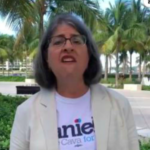 Levine Cava said. “The Mayor also blocked voters from having the final say in November through his veto of the charter amendment. Like everything he has done, he pulls us two steps back from the positive step forward the commission took last week.”
Levine Cava said. “The Mayor also blocked voters from having the final say in November through his veto of the charter amendment. Like everything he has done, he pulls us two steps back from the positive step forward the commission took last week.”
Congresswoman Debbie Mucarsel-Powell, who Gimenez hopes to run against in November, also issued a statement: “I am profoundly disappointed by Mayor Giménez’s veto that overturns the will of the County Commission, community groups, and the people of Miami-Dade, who have been calling out for structural reform in the wake of George Floyd’s murder and police brutality in our own community.
“Reform requires accountability and transparency, which can only be achieved through a civilian oversight board that is independent and has subpoena power,” Mucarsel-Powell said. “Mayor Giménez’s veto blatantly disrespects the Miami-Dade residents who are crying out for accountability — it’s clear he could not be more out of touch.”
It also doesn’t bode well for the change in and of itself. Grimenez said he hopes it comes back in its homogenized form. But he’s lying. As evidenced by his statement. Because he thinks the police have enough safeguards and he would rather pass it off for his successor to deal with rather than have it become a campaign issue for his congressional bid. Remember, he vetoed it in 2018 also.
If the commissioners who voted against this didn’t have their heads up their discretionary accounts, they would realize that this undermines them anyway. By vetoing their body’s decision, Grimenez is letting them know that he is the ultimate authority here, not them. He sets the rules, and breaks the rules. Whatever they think they are doing, whatever they think they achieve, he is just allowing them to do so, tolerating them. Barely.
The commission should send a message to Gimenez and the next incoming mayor, whoever that may be, that vetoes are not to be taken lightly or to protect oneself from scrutiny.
And that nobody is above the law. That’s the whole point of the panel.

